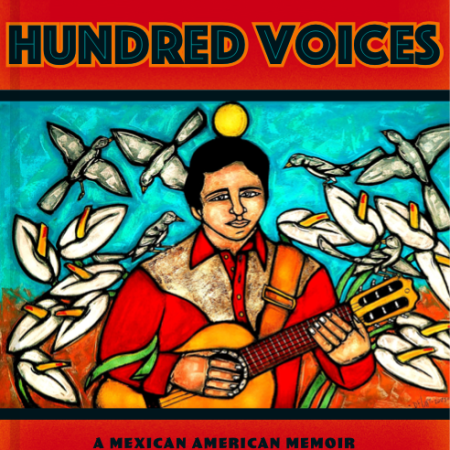Bird of Four Hundred Voices: A Mexican American Memoir of Music and Belonging

From an early age Eugene Rodriguez knew he was captivated by music. But he found himself encountering the same two problems again and again: the chilly rigidity of so much formal music education, and the underrepresentation of Mexican culture in American media. In 1989 he founded Los Cenzontles (The Mockingbirds), a group that offered music education to Bay Area youth, and that gave pride of place to Mexican musical traditions.
Bird of Four Hundred Voices (Heyday Books) follows Rodriguez as he leads his young students from a California barrio to uncover their ancestral roots. From their home community in San Pablo, Los Cenzontles journey to fandangos in Veracruz, resurrect a lost mariachi tradition, and collaborate with luminaries like Linda Ronstadt, Lalo Guerrero, Taj Mahal, Jackson Browne, Flaco Jimenez, and Los Lobos. Rodriguez’s story offers an honest, deeply personal look at the cultural work that confronts historical oppression and joyously challenges cultural borders. And it is a profound celebration of the powerful influence of Mexico’s musical heritage on American culture.
Advance praise for Bird of Four Hundred Voices:
An inspiring tale of the transformative power of culture.
Linda Ronstadt
“A son of so much: activism, history, art, pride, California, Mexico, the world. Each sentence, paragraph, page and story is a fandango for the soul.” —Gustave Arellano, L.A. Times columnist and author of Taco USA
“For many years, I have been hearing of some kind of magic that Eugene Rodriguez was creating across San Francisco Bay, with an institute of serious fun. He named his enterprise after mockingbirds, Los Cenzontles. The mockingbird has no song of its own, but an imitative reverence to collect, to mimic, to preserve. This glorious memoir is unlike other ethnic memoirs I have read because, by eschewing politics in favor of Mexican popular culture, Eugene Rodriguez recollects his own growing appreciation of the play of Mexico within himself. For centuries Mexico has withstood political failures by means of the gathering festival—the union of old and young, the living and the dead, wit and romance, the sombrero’s bow and the wise smile of the skull. In hardscrabble San Pablo, California, Eugene Rodriguez records his life’s work first as student then as teacher: He has taught young men and women and children to dance and sing with the dead.” —Richard Rodriguez, author of Hunger of Memory
We sometimes make mistakes, and we are happy to correct any errors that you may come across on our site. If you find an error, please let us know using the “submit a correction” link.